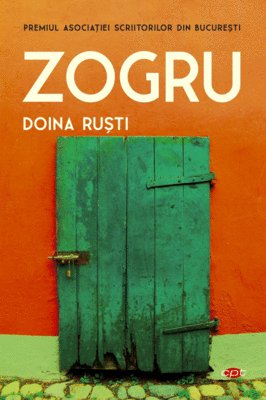

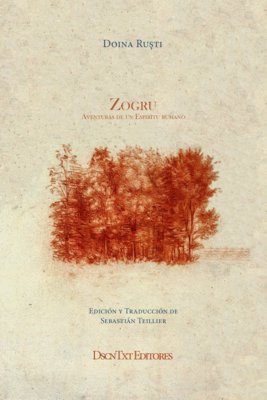
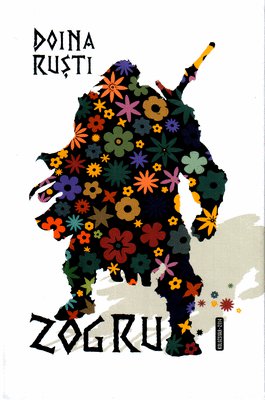
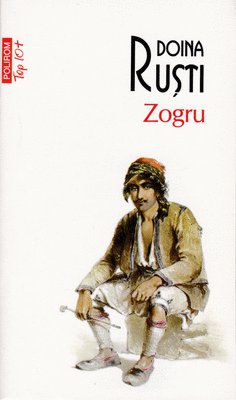
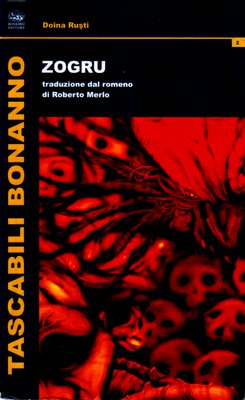
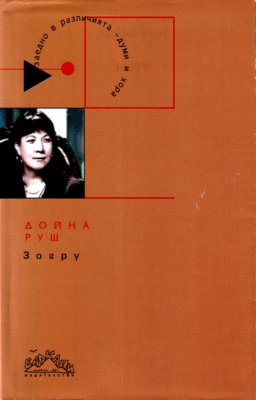
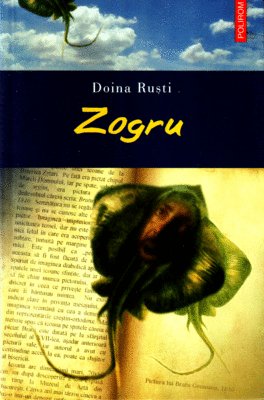
As soon as Zogru had escaped from bondage he suffered locked in the gates of plane tree wood, his first thought was to get to Comosteni, still called Coteni in those days. He didn’t arrive right away, of course. On the night of the fire, thinking with instinctive terror that he might fall in the water, he crawled in agony to the lake shore. He was (as he had been that first time when he’d been able to catch a glimpse of himself), a serpentine stream of spirit, colorless this time, shimmering here and there like water in sunlight. He looked at himself in the sheen of the lake and felt moved by the wavy image and by Pampu’s reassuring eyes. This was his image of himself, which only he was able to perceive and which he would actually see at splendid ball, somewhere around the year 1733, when he would look at himself for almost an hour in the great mirror. There, he would see the dancers as well. It would be plain then that they could not see him as he reared his filament-thin body, its filmy wings stamped with Pampu’s face. No one could really see him. Still, an onlooker focusing on the mirror and ignoring his own reflection, might finally have been able at last to discern Zogru’s image, like a frail shadow that wore Pampu’s luminous face.
But now, on the night of his deliverance, Zogru quieted down right away when he saw that familiar, reassuring visage. Next thing he knew, he felt himself being drawn to a young monk as to an oasis so that he was absorbed into young monk’s body without any effort of his own. The monk died 40 days later, and Zogru made his exit, as he had from Pampu’s body, like an ectoplasmic cross, its arms like tattered wings, and from there he almost gushed into the body of another monk who had bent over the cadaver. Nor did Zogru remember this monk very well. All in all, five monks died between the fast days before Christmas and the end of Lent.
Special services were held in the monastery, for many people believed that Dracula’s ghost still held sway over those locales and that after the great blaze had reduced the miracle working icon to cinders the unclean spirit had entered the deceased monks, leaving two red marks on each of their necks. The abbot sent word to the palace and the metropolitan’s see in the capital, Targoviste. He asked for the help of other monasteries and lit a great cross of holy basil and willow fronds that set up an incense for a whole hour in the place where the monastery’s plane tree gates had been. They mixed the ashes of the sanctified cross into a poultice for the throat of the monk Augustin, swollen with two red pustules the size wheat grains. All the other monks who had passed away had had their necks marked by bites, and now, without the least doubt, the entire community awaited Augustin’s death.
In Passion Week, seven priests assembled, two of them from as far as Targoviste, and they held a high mass where the gates had been. Then, in the dead of night, they opened the grave of Vlad Dracul (the Elder). Holding torches, they gathered in a circle, and, smiling and cheerful as always, the monk Dionisie brought the basin with holy water and let himself down below the lip of the grave. One by one, he took the clay-covered bones and laved them unhurriedly. He listened to the prayers whispered by his brethren and inhaled the smoke from seven golden censors. Then he laid the bones on a clean towel beside a small heap of objects he’d found scattered throughout grave, a few buckles covered in verdigris, a silver ring lacking a seal, and a pair of child’s ear rings, which the dead man had had in his pocket or that had come from elsewhere—the bowls of the earth.
They held the service for remission of sins and release of the soul after that, after which they burned the bones on a new hearth of uncut stones made especially for the occasion. The next day, Dionisie swept the ashes with a new hearth broom of wild turkey feathers and deposited the ashes with utmost care on the towel together with the trinkets. He placed all of these together into a small pine casket that two ancient monks had sealed all round with molten silver. They weighted it with large river stones and catapulted it into the midst of the lake.
Zogru didn’t feel sorry for the dead monks though he was peaked by the idea of so rapidly changing his warm dwelling place. He’d entered his sixth monk, an old jade who would continuously mumbled down the odd scallion, crust of bread, blob of plum resin or what-have-you. You name it, he’d chew it, and what irritated Zogru was that there was simply nothing he could do about that. He was weak in this new cycle of his life, almost inert. He would have liked to sack out in the sunlight or drink wine in the monastery’s wine cellar. The old fellow, whose name was Augustin, turned out to be unstoppable. He went in whatever direction he pleased, rose before the crack of dawn and munched all kinds of stuff, non-stop. Zogru took pains to check Augustin from the first week—for example, to make him give up the spring of basil he’d just snapped in his hand, but that was easier said than done. And indeed, Zogru strained so hard that he finally gushed out of the two inflamed orifices on the old man’s throat. When Zogru caught a glimpse of himself, he looked like a slab of incipiently thawing ice that had taken the deformed butterfly shape he recalled.
But thus he found that he could exit at will.
This discovery cheered him no end and for several days he played around entering and exiting bodies at random so that at the end of Easter at least twenty monks displayed wounded necks and had the fear of death stamped on their faces. No one could see Zogru, but he felt the presence of humans like the touch of a cool breeze.
He chanced upon Dionisie during these trials and tribulations, and he felt a sudden desire to enter his blood, the way you’d get an urge to pay a visit. Dionisie was impregnable, though. Zogru slammed into his neck as if it were a brick wall. Rather than feeling sad, he rejoiced that life offered such variety. He now knew that there were bodies that wouldn’t obey him, others he couldn’t enter, and he would soon find that there were still others that would kick him out without further notice—for in those days he had yet to experience bodies that would hold him captive. There were people who could hold him prisoner, though. He would stay in their blood for 40 days without being able to leave until they died, and only then would he regain his freedom. There was another means of escape from whatever his current present surroundings might be however, a riskier one, with a chance of unfortunate misfire—which is to say, he could remove himself far beyond his local habitation, as would happen in 1912, when, flushed and imprudent, Zogru would blunder into the body of a drunken Cossack from whom he would not get free until the host made it to Kiev, where Zogru spilled out on the cold cobble stone. There, everything went black on the spot. He came round two years later in the land of his birth at Comosteni.
With Augustin, however, he had discovered that he might limit his visit, and the joy of these short stays lasted for a while, but then Zogru also went through periods in which he killed systematically, without pity. For whole years he only entered the bodies of criminals and crooks, then of fancy women. There followed the period of politicians and diverse leaders. He never actually enjoyed people’s deaths, at least not after witnessing them in their hundreds. Even when he had become case hardened, killing left and right, he still felt the pain as if there were a canvas stretched from the top of his chest all the way to his gorge, although he never grieved for anyone as he had grieved for Pampu, unless maybe for a woman whom he would left fall of a street in Istanbul, with her forehead on the threshold of a pagan house, sometime back in 1812.
Now, however, in the springtime in the year of our Lord, 1510, he had decided to do no further killing. The fact that he could leave his host at will before the end of the fatal 40 days reassured him in his belief that the hosts thus deserted might live long and prosper after that, although he was not fully certain at the time. But all Zogru had to do now was wait four more weeks to see how Augustin fared. On the other hand, Zogru thought, if Augustin fared well, his own peaceable life-cycles might be curtailed. Instead of the usual 40 days, he would have to a stay of a mere 15—who knows?—even less, which seemed hellish to him, especially after he realized he couldn’t enter just any body. And suddenly another thought hit him, more agonizing still, and which would haunt him for the rest of his fragmented days, so that he was lashed by the thought of his own poor bit of time. How much was left? How much longer might he be able to do the round of hosts. He would have liked to know how long was he given to live, at least, in the way that people hope to live for a hundred years—though it’s true that death may come any time—but as for him, how long might he hope to carry on? If there were a law for all, it would mean that since 50 years had vanished his life was half over. And as he thought and though, a hundred years went by, two hundred, five…from that moment on, and nothing happened, only that, although so much time passed over him, he went on ruminating over the problem, as anxious as ever about the hour of death and with the same desire he had felt back in the spring of 1510, to live long, to love and be loved, to enjoy life and seize each day.
One June day, however, when the term of 40 days since Zogru had entered Augustin had fallen due, the monk was to be found foraging about happily for provender to stuff himself with, as was his wont. Everyone at the monastery heaved a sigh of relief, and Zogru along with the rest. But only around Christmas were the monks convinced that they had extirpated the deathly evil spirit, and they dedicated a mass of thanksgiving to the good Lord.
Zogru had meanwhile gone out into the wide world, and he returned just in time to write his first letter with the hand of Teodosie, whom he held dear and inhabited thrice, the first time taking place around the end of May 1510, when he cleaved unto him, most particularly because he seemed easy to manipulate. It was inside Teodosie that he left the monastery and trekked all the way to the house of High Secretary Gongea, which for Zogru was like a second home. But all had changed. Mascatu had died, and Ghinghina was in the throes of death.
Zogru rode into the house in Teodosie’s body and flew like a bullet to the bed where Ghinghina lay attended by Nalbia and another older woman. Her face had swollen, puffy as fermented dough, and her eyes were closed. The monk drew back almost hesitantly, with all of Zogru’s distress printed on his face. Zogru knew Ghinghina was well-stricken in years. He had seen her worshipping at the gate of the Snagov monastery perhaps a year ago, but he had never imagined her in such dire straits. Only when she opened her eyes did she regain a shadow of her former looks. Teodosie smiled at her, and because Ghighina looked at him in a troubled way, as if from the end of the earth, he drew closer and whispered in her ear: _ It is I, Zogru, if you still remember me. We met long ago when I was Pampu_. Then he looked at her to see if she stirred. Ghighina’s eyes popped open like champaign corks. Then her mouth opened and her soul slipped out between her crinkled lips like a tiny ball of hot light.
As for Teodosie, he had no idea what he was doing in that place. Shocked and sorrowing, Zogru let the monk return to Snagov while he stayed on at Coteni for a few more days. Tenica had died long ago, but he knew that already, for she hadn’t visited the miracle-working icon for years. None of the people he knew were alive anymore, only their descendants, who resembled them, more-or-less, so that he didn’t have to ask anyone to know whose child was whose. And so he looked for Tenica’s children, hoping one of them would be his, for in those days he didn’t know that the men in whose blood he dove became immediately sterile and only recovered a few months after he’d left them.
In the newer generation, Petru the Pockmarked, son of Ionita, was the overseer of Ghighiana’s estate now, and like his father he had a way of looking down his nose, convinced that no one but he counted in this world, which made Zogru call to mind that night when the ring had been unearthed.
Having tarried there long enough, however, Zogru set to roaming through neighboring villages, through woods, through “glole”- infested cellars. Then he made his way back to the fortress of Targoviste, so that by the beginning of October, having passed through thousands of people, he knew many more things about life than Pampu had learned in his 25 years. Then he returned to the monastery as if to his own home and entered Teodosie again, just in time to see what was afoot and to write his own first letter:
God is great and all knowing. Let not thyself be tempted by the Evil one, fallen in error. But do come and restore the good-luck charm to the earth.
I await you in the place thou hast plundered, Friday, after nightfall.
Father Teodosie,
Of the Snagov Monastery
He then dispatched the letter by messenger all the way to the estate of the overseer, Petru son of Ionita in Coteni. He enjoyed the thought of being able to frighten the Pockmarked’s son, who had taken the ring from the grave dug by Iscru. Then too, he wanted to see the horror on Petru’s face with his own eyes.
To while away his time till Friday, he left for Targoviste with a woman who had come to the monastery for confession. The moment he reached the fortress, he immediately entered the body of a boyar’s servant and then the body of a carousing captain, in which he was nearly trapped. He played cards at an inn at Cirta’s Crossroads and managed to lose all the captain’s money. But since the man was drunk, Zogru found himself in a drunken stupor as well, unable to gush his way out of the captain’s body. Only a day later did he tumble into the dust of the road where the captain had fallen asleep, and he set off for Sotana in the body of a merchant, and from there he went through the woods with a gypsy who was out collecting plum sap.
By noon he had arrived at the monastery, gypsy and all, and found no way to enter the precincts. They had just finished the new gates, and now the monks’ cells and the small church at the back were safely surrounded by stone walls and clean wooden gates. No one came out, no one went in. In the end Zogru knocked on the gate and, because the porter gave no sign of opening and kept asking what he wanted from the wall above, with his humble gypsy face Zogru begged to see Father Teodosie. At long last the monk came out through the new gate and Zogru immediately flew at his throat and made his cheerful way back to the cells with a different face.
As soon as night fell, he went to the place where the old gate used to stand, which was now further from the cells than the new one. He stood by the lakeshore and smiled with a Robert De Niro air, when the actor has something up his sleeve. He didn’t know exactly why he wanted Petru to bring the ring, nor had he decided what he would do after that. He was simply thrilled with the prospect of seeing Petru’s sheepish look. It had gotten cold, and a sourpuss wind blew over the surface of the water. There wasn’t a soul to be seen. He would have liked to have Ionita the Pockmarked there, to feel humiliated when his son brought back the ring. Back then, he still didn’t know that the bloodline from Ionita the Pockmarked all the way down to the traitor Andrei Ionescu didn’t care a fig for lessons of this kind—and indeed, in later days Zogru himself would feel like laughing when he remembered his sentiment of yore—the satisfaction and joy locked up tight in the secret compartment of his soul and reserved for the moment when Ionita’s son Petru would appear with the ring. Nor would he soon get over the grief he felt when Petru’s arrow flew toward him from the rushes surrounding the lake. The guy had really gotten scared, but not in the way Zogru imagined. Petru hadn’t really come a cropper. No siree, he’d prepared well for the event. He had brought down six large gourds from the roof of his house to keep him afloat on the lake, and he approached from the north starting from a place he knew well since childhood. With the floating buoys tied to his waist, he swam easily to the growth of rushes near the island. The water was cold, but he was used to that, and he had left his clothes in the hollow of a tree so that he could grab them quickly on the way back.
Now, Petru had a special bow. It shot arrows with a vicious spin, and he kept that bow for just such occasions. Petru let fly the moment he saw Zogru-as-the-priest huddled on the shore, and he didn’t wait to see how he fell. He made off right away to the place he came from, and Bob’s your uncle, he was gone. It was a cruel blow for Teodosie and for Zogru, for the arrow was poisoned with a mixture that entered the blood slowly. Zogru hadn’t the heart to leave Teodosie’s body, for he was grieving for the priest, and he sensed that the moment he departed, Teodosie would die on the spot. Nor was he in a state to drag himself back to the gates, priest in tow, so, in the end, he agonized there for hours. When Teodosie gave up the ghost at last, Zogru suffered a while on the lakeshore until a human soul happened by.
Translated by Jean Harris & Florin Bican
[Une cronique]
Goodreads: https://www.goodreads.com/author/show/2919952.DoinaRuti